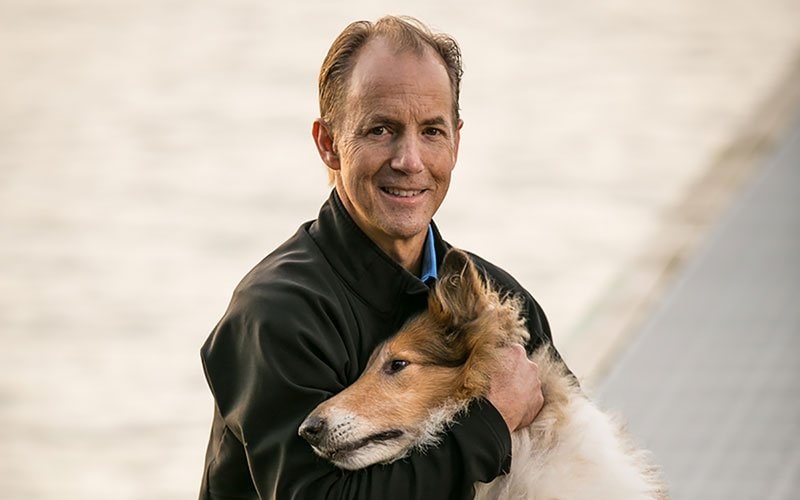Tackling a Cancer Diagnosis with Quality Care Built Around an Active Lifestyle

When Kevin Harrang got his diagnosis of multiple myeloma – an incurable blood cancer – he was at the top of his many games: successful corporate attorney at Microsoft, entrepreneur with a legal technology start-up company, volunteer at a local legal-assistance program, avid tennis player, kayaker, bicyclist and all-around sportsman in a sports-loving family.
As he puts it, "If you can buy something at REI for it, then we do it."
With the cancer came the need, first, to see himself in a new way.
"It took a lot of reorientation to get from an image of myself as a granola-eating, Gortex-wearing, Northwest outdoors person to cancer patient."
Then came the need to see himself as living his life with cancer, managing it, not beating it.
In making that journey, he was helped by his team of physicians from EvergreenHealth and Seattle Cancer Care Alliance (SCCA).
Intensive, Life-Saving Treatment
With the diagnosis, Kevin said, "My outlook as a healthy person had really come crashing down, and so then what I needed to do was understand what was going on, what the possible treatments were for this. And then I had to do this reorientation: how much of my former life could I incorporate into my future life with this treatment and new health issues?"
In Kevin's case, the treatment options included intense chemotherapy, radiation therapy, two rounds of stem cell transplantations (the first using his own stem cells, and the second using stem cells from his brother) and maintenance chemotherapy using a new drug in a clinical trial.
And, as if all of that wasn't enough, Kevin had open-heart surgery to treat an infection affecting a heart valve that had to be repaired.
The treatment was aggressive because, one, the cancer was aggressive and, two, because Kevin was 51 years old, which is relatively young his kind of cancer.
The goal with relatively young patients such as Kevin is to help him survive as best as possible while ensuring the cancer does not progress.
Getting Back to Good Health
Getting to good health again could be "brutal," said Kevin, "especially to begin with when I was laid pretty low and going through the first part of the treatment. For example, I couldn't play tennis, and I was a big tennis player."
Kevin's solution to being laid low was to find "the essence of things that I used to be able to do and then find other avenues for doing them going forward."
When he couldn't play tennis, Kevin found a professional coach and learned to play competitive table tennis.
"I'd go over and play with the Chinese players, which was really fun. These nine-year-old kids would totally kill me."
Finding the essence of what he enjoyed helped Kevin throughout the worst periods of his treatment, when he was in intensive care, he says, "It's super hard if you're in intensive care in a hospital and you're nauseous and, you know, feeling worse than you could ever imagine. But it turns out there's an exercise bicycle down the hall, and you can do 20 minutes on that."
Today, Kevin has pretty much returned to the life he had before cancer.
He is back to work helping clients at a pro bono legal clinic, serving on a nonprofit board, traveling – and playing tennis again. He calls it "a complete miracle. The kind of cancer I have is the kind of thing that they can knock down but have a difficult time eliminating, so it's all about living with it. This metaphor that you're going to fight it and you're going to beat it is not really applicable because, in the long run, none of us beat it."
In learning to live with his cancer, Kevin says he had "to reassess what's important. I found the support of family and friends to be the single most sustaining thing, and also being able to be really present in the moment – as they say in yoga class. One of my personal rules for living has always been 'find joy in every day.' Even through the darkest days of treatment, I found this to be more imperative than ever."
Cancer Treatment Close to Home
Remaining close to the support of family and friends is one reason Kevin chose EvergreenHealth and SCCA for his cancer care.
"We live in Kirkland. We had been patients at EvergreenHealth - for instance, my daughter had her appendix taken out there - and we would go there. It seemed like a super professional place close by, and it was a good choice," says Kevin.
As for choosing SCCA for what he calls "industrial-strength chemotherapy followed by stem cell transplant," Kevin says, "I was in a position that I could really have gotten treatment anywhere. I spent some time looking around at the other centers in the world. If there was someplace better, then I could have done that. In the end, I concluded that the local treatment options were world-class. But even if I'd thought that some other place was a little better, the idea of being away from home and my support network would have trumped that. And that has made all the difference."
Part of the network that sustained him turned out to be his doctors.
His EvergreenHealth physician "has been a good friend and colleague as well as my treating physician." And his SCCA doctor said that one of the privileges of caring for patients such as Kevin is feeling almost "like I'm a family member with them. I'm able to see how much patients' families support them. I get to see the best of people giving to each other."
"Today I'm back in the game," says Kevin, with obvious joy.
For More Information About Cancer Care at EvergreenHealth
Learn more about cancer care at the Halvorson Cancer Center at EvergreenHealth